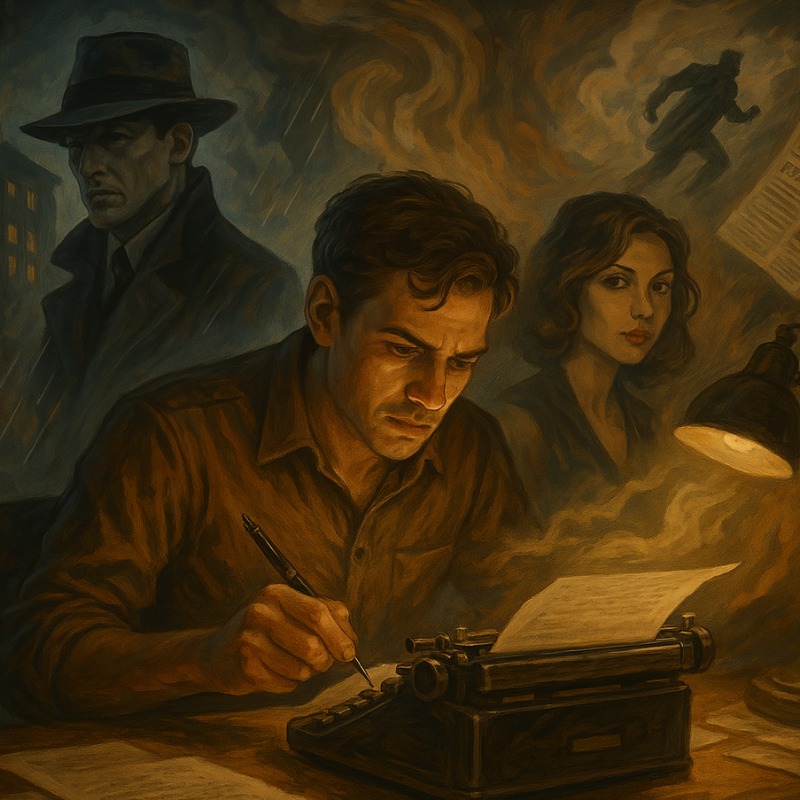The Ink Between Worlds
Caleb Wren had always prided himself on his vivid imagination. His stories weren’t just fiction—they felt real, alive, as though he were merely transcribing events from some unseen world. But nothing prepared him for the book that would change everything.
It began with an idea, one that came to him as if whispered by an unseen voice. A title appeared in his mind: "The Ink Between Worlds." He had no outline, no plan—only a strange compulsion to write.
As his fingers moved across the keyboard, the story unfolded effortlessly. It followed a protagonist named Elias Finch, a struggling writer who discovers that everything he writes manifests in reality. The concept thrilled Caleb—until he noticed something disturbing.
The events in his book weren’t just appearing in fiction. They were happening around him.
It started small. A new café named "Finch’s Roost" opened across the street—the same café he had written into his novel the night before. A minor coincidence, he thought. But then, he noticed something chilling: the café’s owner, a man named Harold Bishop, had the same face, mannerisms, and past as his fictional character.
Caleb tried to shake it off. Maybe his subconscious had picked up on details from real life without him realizing. But as he wrote more, the world around him shifted.
One evening, lost in a creative haze, he introduced a mysterious woman named Mira Voltaire—an enigmatic figure with silver eyes who knew more about the book’s reality-warping powers than Elias Finch did. The next day, a woman fitting Mira’s exact description sat across from him on the subway, her gaze piercing through him like she knew.
His heart pounded. Had he seen her before? Was his mind playing tricks on him?
He decided to test it. That night, he wrote a single sentence into his book:
"Elias Finch wakes up to find a black feather resting on his pillow."
The next morning, Caleb’s breath caught in his throat. A single black feather lay on his pillow.
He shoved the laptop away. This was impossible. Fiction couldn’t dictate reality. And yet—he was holding proof in his hands.
The problem was, Caleb had already written something else.
A villain.
Dr. Gabriel Ormond, a shadowy figure in his novel, was supposed to be the central antagonist—an otherworldly being who fed on the fabric of reality itself. He had written Ormond’s introduction just two nights ago.
And now, things started to disappear.
A lamppost that had stood on his street corner for years was gone. The bakery down the road—vanished overnight, as though it had never existed. Friends hesitated when he spoke to them, their memories of shared moments flickering like a bad signal.
He realized the horrifying truth: Ormond was erasing reality.
Panicked, Caleb reopened his manuscript, fingers shaking over the keyboard. If he could write things into existence, maybe he could undo them, too. He typed frantically:
"Dr. Gabriel Ormond never existed."
The words dissolved as he wrote them. The document glitched. The screen flickered. Then, a low chuckle echoed behind him.
Caleb whirled around. His apartment was empty. But the laughter remained, curling in the air like smoke.
"You can’t erase me, Caleb," a voice murmured. "I’m part of the story now."
A shadow loomed in the corner of his vision. His breath hitched. The figure was tall, cloaked in darkness, its eyes two pinpricks of silver light.
Dr. Gabriel Ormond had stepped out of the book.
Caleb scrambled backward, knocking over his chair. His mind raced. He had to regain control. He had written Ormond into existence—he could unwrite him.
He lunged for his laptop, fingers flying. He wrote:
"Elias Finch discovers Ormond’s weakness—his existence is bound to the pages of the book."
Ormond staggered, his form flickering like a faulty signal. Caleb kept typing.
"To destroy him, Elias Finch must burn the manuscript."
Ormond snarled, lurching toward him. The lights in Caleb’s apartment exploded, plunging the room into darkness. A force clamped around his throat—cold, suffocating. His vision blurred.
With his last ounce of strength, Caleb reached out, grabbed the printed pages of his manuscript, and struck a match.
Flames licked the edges of the paper. Ormond screamed. The shadows around him writhed, shrinking, curling inward. Caleb gasped for breath as the pressure on his throat lifted.
The fire consumed the pages, and Ormond disintegrated with them, his form unraveling into ink and ash.
Then, silence.
Caleb woke hours later to the scent of burnt paper. His manuscript was gone. His laptop screen was blank. His hands trembled as he reached for his phone, checking the news.
The café across the street—gone. Harold Bishop—never existed. Mira Voltaire—vanished. Every trace of the story he had written had been erased.
He should have felt relief. Instead, he felt empty.
Then, on his desk, he noticed something.
A single black feather.
And beneath it, a note in unfamiliar handwriting:
"Stories never truly end."
Caleb swallowed hard. He reached for his laptop. The blank document pulsed, waiting.
With hesitant fingers, he typed the first words of a new story.
Somewhere, a shadow stirred.
And the ink between worlds began to flow once more.....



 React
React
 React
React
 React
React
 React
React
 React
React